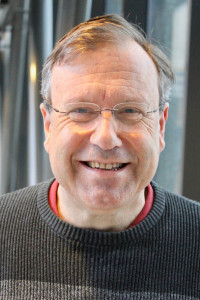Professor

We are interested in unraveling the mechanisms by which transforming growth factor-β (TGF-β) family members elicit their multifunctional cellular effects and how perturbation in their signal transduction pathways contribute to human diseases. Previous research from us and other laboratories have now firmly established the intracellular signaling cascade of TGF-β via serine/threonine kinase receptors and SMAD transcriptional effectors. However, how this pathway is (mis)regulated in cancer and other diseases, remains not well understood. New research lines have been developed at the interface of biology and chemistry that are different from contemporary methods, with the aim to redirect signaling responses with synthetic molecules for therapeutic gain.
Peter ten Dijke received his Ph.D. degree in 1991 from Wageningen University, The Netherlands based on his research on the identification of the third isoform of TGF-β performed at Oncogene Science, Inc., New York, USA. He did his postgraduate studies with Kohei Miyazono and Carl-Henrik Heldin at the Ludwig Institute for Cancer Research (LICR), Uppsala, Sweden. In 1994, he became group leader at LICR and in 1999 he moved to the Netherlands Cancer Institute, Amsterdam, The Netherlands. In 2005 he moved to the Leiden University Medical Center, Leiden, The Netherlands, and is currently a professor of molecular cell biology at Leiden University. His laboratory studies how subverted TGF family signaling is involved in cancer, vascular and bone diseases.
Oncode Institute researcher (2018-2027)
Guest professor at Uppsala University, Uppsala, Sweden, Tsukuba University, Tsukuba, Japan and Zhejiang University, Hangzhou, China.
Consultant for Agomab Therapeutics, Belgium (from 2022),consultant for Interact Bio, UK (2024-present)
Member of Scientific advisory Board: Leakna Pharmaceutics (China; 2021-present)
van Dinther M, Cunningham KT, Singh SP, White MPJ, Campion T, Ciancia C, van Veelen PA, de Ru AH, González-Prieto R, Mukundan A, Byeon CH, Staggers SR, Hinck CS, Hinck AP, ten Dijke P, Maizels RM.
Proc Natl Acad Sci U S A. 2023 Aug 22;120(34):e2302370120. doi: 10.1073/pnas.2302370120. Epub 2023 Aug 17. PMID: 37590410; PMCID: PMC10450677.
Gu Y, Zhang Z, Camps MGM, Ossendorp F, Wijdeven RH, Ten Dijke P.
Sci Adv. 2023 Jul 14;9(28):eadf9915. doi: 10.1126/sciadv.adf9915. Epub 2023 Jul 14. PMID: 37450593; PMCID: PMC10348683.
Fan C, Wang Q, Kuipers TB, Cats D, Iyengar PV, Hagenaars SC, Mesker WE, Devilee P, Tollenaar RAEM, Mei H, Ten Dijke P.
EMBO J. 2023 May 15;42(10):e112806. doi: 10.15252/embj.2022112806. Epub 2023 Mar 30. PMID: 36994542; PMCID: PMC10183827.



Looking for information on one of our topics, a new place to conduct your research or experienced research to join forces with? Feel free to contact us.!